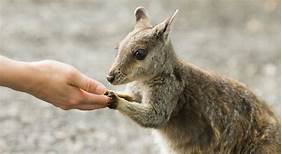Can a Kangaroo Be a Pet?
Kangaroos are intriguing creatures that embody both strength and grace. Their distinctive features, including their powerful legs, pouch, and unique form of locomotion, have captivated humans for centuries. While these marsupials have garnered popularity as wildlife attractions and symbols of Australia, the question arises - can a kangaroo be a suitable pet?

Kangaroos as Pets: Reality Check
In reality, kangaroos are not typically suited for life as domestic pets. There are several key reasons why it is generally inadvisable to keep them as companions:
1. Size and Strength
Kangaroos are large animals. Depending on the species, they can grow up to 6 feet in height and weigh over 200 pounds. Their muscular bodies and powerful legs endow them with incredible jumping capabilities, allowing them to clear distances of over 30 feet. Harnessing this power for domestic purposes can be highly challenging, and their strength might pose a safety risk in an uncontrolled environment.
2. Behavioral Traits
Kangaroos are wild animals with a distinct set of instincts and behaviors. They are social creatures that thrive in groups or mobs, relying on their acute senses and agility to navigate their natural habitats. Confining a kangaroo to a domestic setting could lead to boredom, frustration, and even aggression towards humans. Additionally, kangaroos can inflict serious injuries using their claws and hind legs if they feel threatened.
3. Diet and Nutrition
Kangaroos are herbivores with a specific dietary regimen. They primarily consume various types of grasses, leaves, and other plant matter. Providing a balanced diet that meets their nutritional needs can be complex and time-consuming, particularly in an urban or suburban environment. Failing to meet these dietary requirements can lead to health issues and malnutrition.
4. Legal and Ethical Considerations
In many countries, there are legal restrictions and ethical concerns regarding the keeping of kangaroos as pets. Some jurisdictions have banned their ownership altogether, while others have strict regulations and licensing requirements. Furthermore, obtaining kangaroos from the wild is typically illegal, as they are a protected species in their native habitats. Ethical concerns arise from the potential for mistreatment, inadequate care, and disruption of their natural behaviors.
Alternatives to Pet Kangaroos
While the allure of kangaroos as pets is understandable, there are alternative ways to appreciate and learn about these remarkable animals:
1. Wildlife Sanctuaries and Parks
Visiting wildlife sanctuaries, zoos, or national parks that house kangaroos provides an opportunity to observe them in a controlled and safe environment. These facilities often offer educational programs and guided tours that provide insights into the biology, behavior, and conservation status of kangaroos.
2. Documentary Films and Books
Watching documentaries and reading books about kangaroos can offer valuable knowledge and appreciation for their diverse world. These resources can shed light on their unique adaptations, social dynamics, and the challenges they face in their natural habitats.
3. Wildlife Conservation Efforts
Supporting organizations involved in the conservation of kangaroos and their habitats is a meaningful way to contribute to their well-being. Donations, volunteering, and advocacy efforts can help ensure the preservation of their natural environments and the protection of their species.
In conclusion, while kangaroos are fascinating creatures, they are not suitable as domestic pets due to their size, behavioral traits, dietary requirements, and legal and ethical considerations. Enjoying kangaroos through wildlife sanctuaries, educational resources, and conservation efforts offers a responsible and meaningful way to appreciate these remarkable animals.
Declaration: All article resources on this website, unless otherwise specified or labeled, are collected from online resources. If the content on this website infringes on the legitimate rights and interests of the original author, you can contact this website to delete it.





